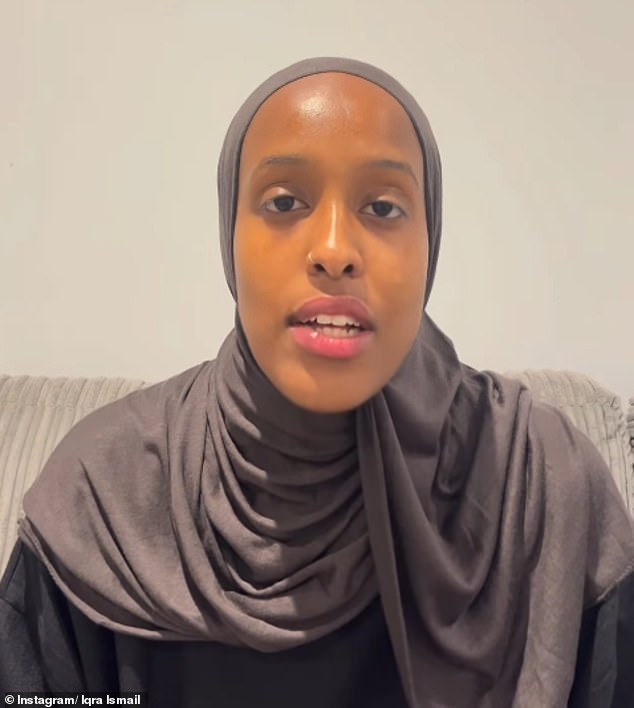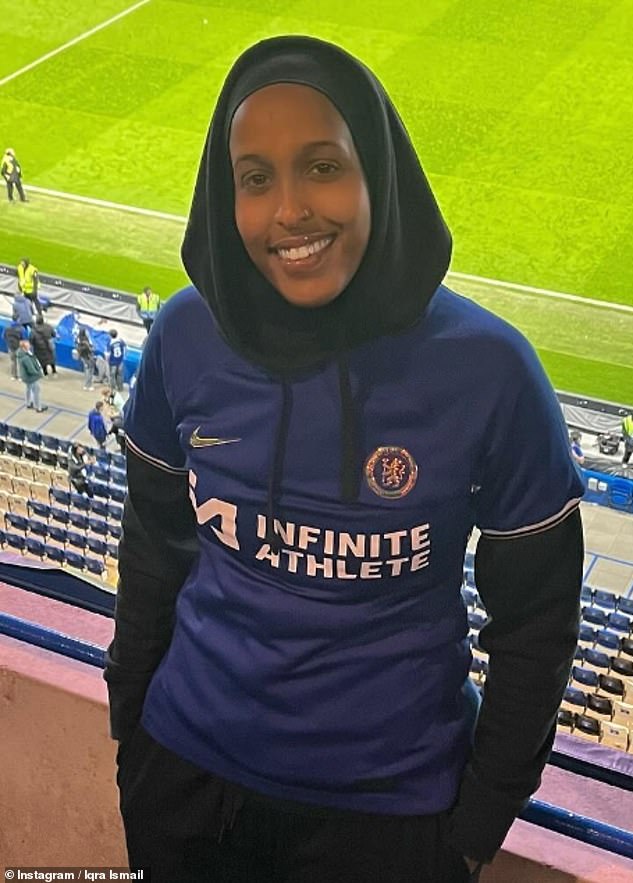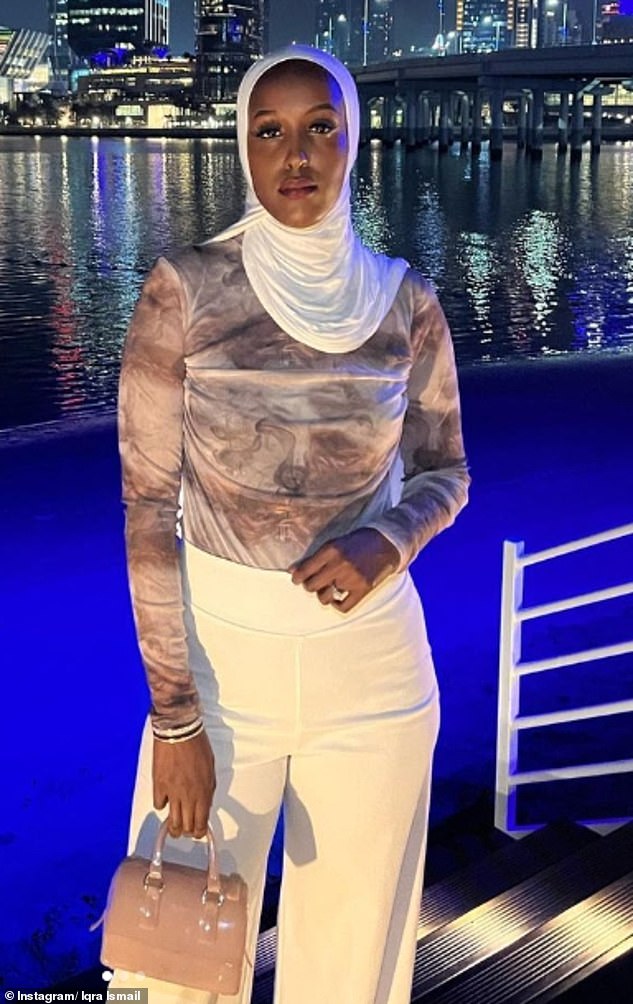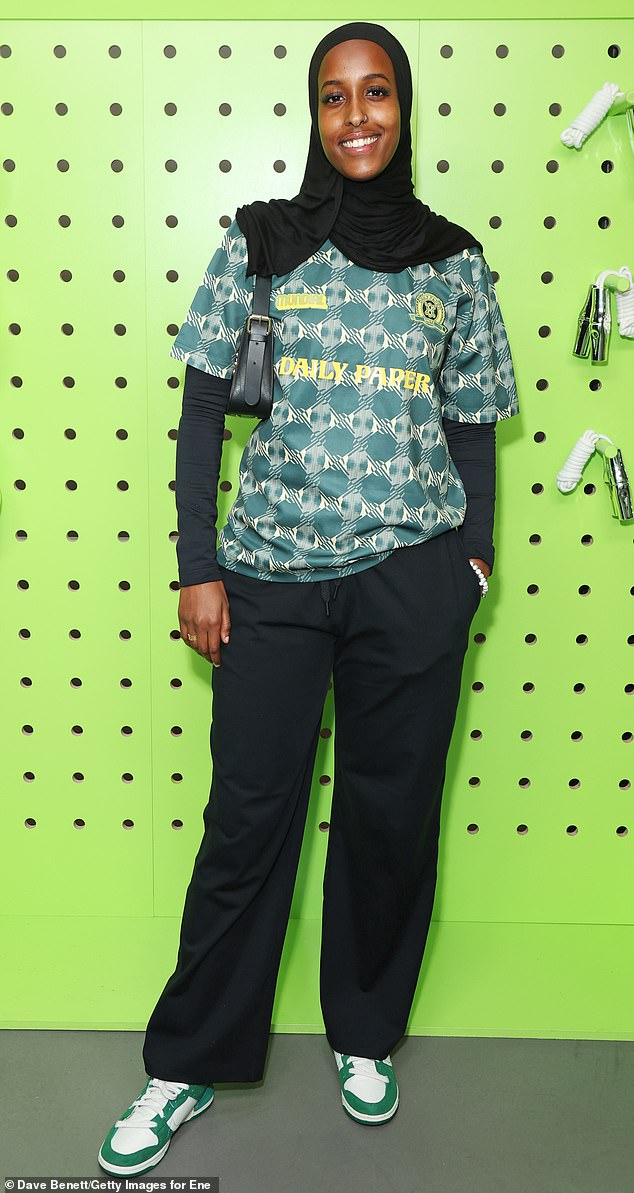The Football Association has apologized to a Muslim footballer after a referee banned her from playing a match for refusing to wear shorts due to her religious beliefs.
British-born Somali football player and coach Iqra Ismail was due to play for United Dragons as a half-time substitute in their Greater London Women’s Football League (GLWFC) match against Tower Hamlets FC on Monday.
However, on Instagram, Iqra claimed that GLWFC stopped her from playing, saying: “They told me I wasn’t allowed to play football because of my religious beliefs.” Yes, you heard right, in 2024.
She continued: “The Greater London Women’s Football League has decided to stop me from playing because I refuse to wear shorts with my playing kit.”
The FA has since apologized to Iqra and explained that she will be able to wear tracksuit bottoms in the next match, according to sky sports.
British-born Somali football player and coach Iqra Ismail (pictured) was banned from playing in a Greater London Women’s Football League (GLWFC) match on Monday.
“I’ve been playing in this league for almost five years wearing sweatpants and every year they make it harder and harder for women like me to play.
“This year, they drew the line and banned me from playing until I compromised my beliefs.
“The Middlesex FA referee for yesterday’s match said he had been strictly told by the league not to allow women like me to wear tracksuit bottoms regardless of the color or whether they match our kits or not.
‘If we don’t wear shorts, we can’t play. That’s what they told me yesterday. So of course I stood by my principles, and that meant I wasn’t allowed to kick a ball yesterday.
“At this level, the priority should be making football accessible, and the Greater London Women’s Football League has done exactly the opposite.
‘I was asked why women’s football lacks diversity and why it is difficult to find women who look like me in competitive football. Things like this are the reason.
“Yesterday I was so angry and frustrated, literally to the point of crying, and I’ve never really felt so isolated, but my responsibility is to stand up for women like me, so that these things can’t happen, because they can’t happen.” ‘.
A GLWFL spokesperson told MailOnline: ‘The Greater London Women’s Football League is fully committed to ensuring football is an inclusive and welcoming environment for all. We are interested in positively collaborating with Iqra as we do with all our members.

Iqra took to Instagram to explain the situation, claiming that the referee would only allow her to play if she was wearing shorts.

The soccer player said Monday’s incident made her feel “isolated” and left her on the verge of tears.

The Football Association has since apologized to Iqra and said she will be allowed to wear jogging pants in the future, Sky Sports reported.
‘We have also been in contact with relevant county FAs and the FA to better understand the details of the guidelines on what women and girls can wear when playing football, ensuring that their faith or religious beliefs do not are compromised.
“It was our understanding that players were allowed to wear tights or tracksuit bottoms to cover their legs, but that they would also have to wear shorts on top, to comply with the club’s color regulations. It was this requirement that our referee sought to comply with. this weekend.
“However, we have since been aware that shorts are not required over tracksuits or tights and that these should be accommodated by the match referee to ensure players feel as comfortable as possible.
“We will be providing this updated guidance to all our match officials and members and want to ensure that everyone, including Iqra, fully supports the principle that players should wear clothing that ensures their faith and/or religious beliefs are not compromised.”
MailOnline has contacted Middlesex FA for comment.
The footballer added in the caption: ‘Some things need to be mentioned. @glflofficial does it better.’
An FA spokesperson had previously told Sky Sports: “We are aware of this matter and are in contact with Middlesex FA to ensure it is resolved quickly.”
‘We proactively wrote to all county FAs and women’s grassroots match officials earlier this year to confirm that women and girls should be allowed to wear clothing that ensures their faith or religious beliefs are not see compromised.
“We remain deeply committed to ensuring that English football is an inclusive and welcoming environment for all.”
This comes after Eni Aluko expressed concern that there are not enough women employed as coaches or broadcasters in women’s football.
Former Chelsea star Aluko, who earned more than 100 caps for England during her playing career, made history in 2014 when she became the first woman to appear on BBC Match of the Day as a pundit.
Many women have since followed in her footsteps, while Aluko’s former Lionesses teammate Alex Scott has hosted the show on multiple occasions.
But Aluko believes there should be more female representation on expert panels on shows such as Match of the Day, while she is also concerned that men are taking over the women’s game when it comes to broadcasting as well as coaching.
Aluko described his thoughts via LinkedIn. I was responding to a post from Tongue Tied Management, which was the 10th anniversary of their debut on Match of the Day.
That statement from Tongue Tied Management read: ’10 years ago today, Eniola Aluko MBE made history by becoming the first woman to be a Match of the Day pundit.
‘As an agency we had been pushing for this for years and Jo Tongue MBE of Tongue Tied Management was working hard behind the scenes to make this happen.
‘Eni has since paved the way for female participation in men’s football, both in the pundits and in the commentary. A big thank you to BBC, ITV, Sky, Amazon Prime and TNT Sports for continuing to support women in men’s football.
“There is still a long way to go, but we are very proud of what Eni has achieved so far.”
Aluko responded by writing: ‘Forever grateful to Jo Tongue MBE and Tongue Tied Management for the love and respect they have shown me as I mark 10 years since my first appearance on Match of the Day as the first female footballer to appear on MOTD. Jo and I believed that women should have a prominent voice in football.
‘I would love to be able to say that in 10 years we have made progress in terms of women in football broadcasting. In some aspects we have gone backwards.”
Aluko then continued to list his concerns and added: ‘1. There are still only one or two maximum regular expert slots for women on several broadcasters. For your information, experts and presenters are two different roles.
‘2. Men now dominate broadcasting (and coaching) in women’s football because there is more money available.
‘This includes male agents with agendas of financial exploitation within the women’s game who demand 20 per cent commissions on salaries that are nowhere near the level of the men’s game. Women will never be able to dominate the men’s game in the same way.
‘3. Sexism, misogyny and racism are still widespread in football fan culture. Some football broadcasters need to quickly improve their duty of care towards pundits who receive such abuse. Sexism, misogyny and racism are not “part of the job.” “There is still a long way to go.”


